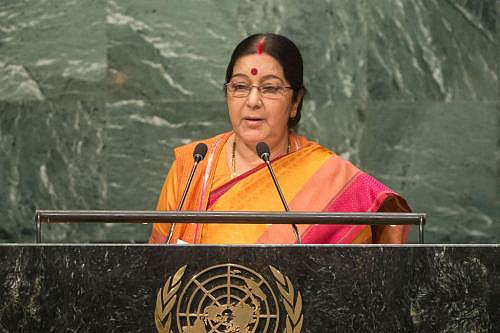Indian FM leaves cryptic memos in Kathmandu
- By Saroj Gautam
 0 Comment(s)
0 Comment(s) Print
Print E-mail China.org.cn, February 12, 2018
E-mail China.org.cn, February 12, 2018

Indian Minister of Foreign Affairs Sushma Swaraj [File photo]
Without an invitation or agenda Indian Minister of Foreign Affairs Sushma Swaraj landed in Kathmandu on the first day of February, to hold rush-hour talks with a handful of Nepali leaders before flying back to Delhi in less than 24 hours – leaving a cryptic footnote behind.
Nepal's Ministry of Foreign Affairs (MoFA) was almost unaware of the content of Swaraj's marathon meeting with Nepali senior leaders as there was no representative of the ministry present in the bilateral meetings. Though India has presented the visit as if its aims were to congratulate Nepali leaders in person for the recent success of their elections, there remains debate as to the surreptitious purposes behind the visit.
High level visits from India are common practice, especially on the eve of major political events in Nepal. But Swaraj's 7th visit to Nepal in her short tenure turned to be the most awkward ever made by any Indian VVIP. No sooner had she landed in Kathmandu, she had to admit at the airport that her visit was without an agenda. "It was a unique thing to watch Swaraj being defensive at the airport about the purpose of her visit, which must be an awkward feeling for the Indian foreign office."
Analysts say Delhi is desperate not to lose its "Big Brotherly" grip in Nepal especially after the landslide victory of the Left Alliance comprising two major communist parties seen as close to Beijing. Though India already has termed the visit as "a success," many in Nepal feel that the Indian FM's visit was unusual, untimely and against basic norms of diplomacy.
While Swaraj was holding the one-on-one meeting with CPN (Maoist Centre) chief Puspakamal Dahal "Prachanda" at a hotel, the former minister of foreign affairs and the senior leader of CPN Maoist Centre, Narayankaji Shrestha, expressed his dismay through social media. "The timing of Sushma Swaraj's current visit to Nepal is not according to normal practice politically and diplomatically. I must again repeat we must maintain our dignity and focus on our national interest," read Shrestha's tweet.
Despite her apparent awkwardness, Swaraj held one-on-one talk with three prominent leaders in Nepali politics and spent most time with the Prime-Minister-in-Waiting, KP Sharma Oli, the chairman of CPN UML, who has been vocal in his concern over India after it allegedly played a role to topple his government in 2016. According to a leader present during the meeting, talks between two leaders begun with informal topics of the needs of the kidney patients (both Oli and Swaraj have had kidney transplants), and later focused on the incoming government's approach towards India and China.
Nepali media have projected Swaraj's unofficial visit as the manifestation of increasing Indian loyalty towards Oli and his party due to the Indian government's ever-growing nervousness over the alleged "pro-China Neighbor Policy" which is said to be adopted by the incoming Left Alliance government. "India is trying to offer such an engagement which could prevent Oli from feeling the need to get closer to Beijing like that of during the Indian blockade. ‘Pro-China Policy Fear' is not limited to Indian media and think tanks; it is prevailing even in political and diplomatic levels in Delhi," concluded the most popular daily in Nepal, Kantipur, in its editorial.
There is a common conclusion among the editors of Nepali major broadsheets that India at the moment is defensive in terms of its relationship with Nepal and has realized the need to correct the course of its past wrong doings. With the election results insuring Oli as Nepal's prime minister for a second term, India has no alternative than to improve relations with him despite his defiant posture in the past.
Displaying unusual levels of loyalty, Indian PM Narendra Modi, in the aftermath of elections, has already telephoned Oli twice to congratulate and wish him a success as an incoming PM. And at the same time Oli has moderated his tone towards Delhi lately. In the letter dispatched to Indian PM Modi on the occasion of the Republic Day of India, Oli expressed his eagerness to work with the Indian government.
One school of analysts in Nepal, however, have come to a rather quirky conclusion though. Accordingly, they suggest that Modi sent Swaraj to Kathmandu on the eve of new government formation just to maintain a prototypical impression that regardless of election results, the government in Nepal is formed only with prior Indian support and approval.
Renowned constitutional and legal expert, the Dean of Kathmandu School of Law, Dr Bipin Adhikari thinks Swaraj's visit was to negotiate the transition of government – and was a failure. "An impatient India could not wait for the formation of the next democratic government in Nepal. It is here to negotiate the terms of change as usual. This is not going to help," his infuriated response reads on twitter.
As the signatory of "Trade and Transit Treaty" with China, many feel that the incoming Oli-led government is likely to focus on the Nepal-China cross border ventures under the glorified Chinese Belt and Road Initiative (BRI).
Saroj Gautam writes on international relations and diplomacy from Kathmandu.
Opinion articles reflect the views of their authors, not necessarily those of China.org.cn.






Go to Forum >>0 Comment(s)